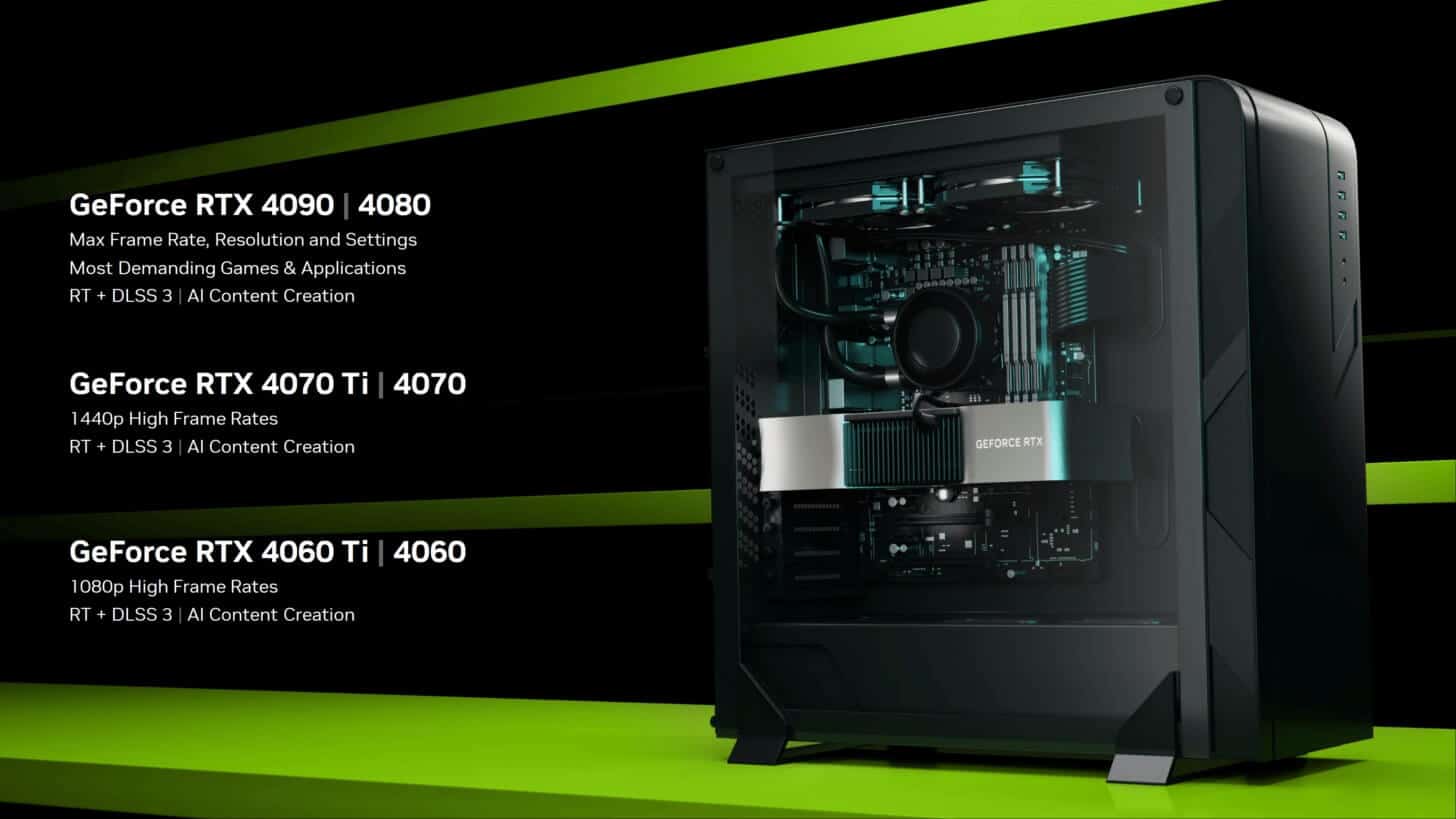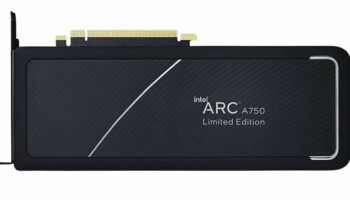Following the launch of the GeForce RTX 4070 Super and the 4070 Ti Super, NVIDIA discontinued the production of the RTX 4070 Ti. However, until stocks last (a few months), all three GPUs will coexist in the sub-$800 market. In this post, we’ll evaluate the RTX 4070 Ti and compare it to the RTX 4080 in 1440p, 4K, and ray-tracing benchmarks. Both cards have been officially discontinued but will continue to be sold until the channel inventory runs out.
NVIDIA RTX 4070 Ti vs 4080: Specifications
The GeForce RTX 4070 Ti leverages the AD104 die, while the RTX 4080 is based on the AD103 die. The latter packs 9,728 cores spread across 76 SMs, 65% more than the former’s 7,680 shaders (across 46 SMs). The RTX 4070 Ti offers 12GB of VRAM, compared to 16GB (+50% higher) on the RTX 4080. The 70-class Ti GPU has a boost frequency of 2,610GHz, while the 4080 operates above 2.5GHz.
| RTX 4080 | RTX 4070 Ti | |
|---|---|---|
| GPU | AD103 | AD104 |
| SMs/ RT Cores | 76 | 46 |
| Shaders | 9,728 | 7,680 |
| VRAM | 16 GB | 12 GB |
| L2 Cache | 64 MB | 48 MB |
| Memory bus | 256-bit | 192-bit |
| Memory Clock | 22.4 Gbps | 21 Gbps |
| Memory Bandwidth | 716.8 GB/s | 504.2 GB/s |
| GPU Boost Clock | 2,505 MHz | 2,610 MHz |
| TBP | 320W | 285W |
| MSRP | $1000+ | $689 |
The GeForce RTX 4070 Ti has a memory bandwidth of 504.2 GB/s, backed by 48MB of L2 cache. The RTX 4080 has a peak bandwidth of 716.8 GB/s (+42%) and 64MB of cache.
Test Bench
- Motherboard: ASUS ROG Maximus Z790 Hero.
- CPU: Intel Core i9-13900K.
- Cooler: Lian Li Galahad 360.
- Memory: 16GB DDR5 x2 @ 6,000MT/s CL30.
- Power Supply: Corsair HX1000i.
Test Methodology
- We tested the NVIDIA RTX 4070 Ti and RTX 4080 (both Founders Edition) on a Z790 motherboard running a Core i9-13900K with 32GB DDR5 memory.
- Eleven games were benchmarked at 1440p and 4K using the highest quality graphics preset, followed by the highest ray-tracing quality preset at 1440p.
- The performance is measured using the average FPS and 1% lows. The latter represents a figure higher than the lowest 1% frame rates. It’s used to gauge the performance in resource-intensive scenarios.
NVIDIA RTX 4070 Ti vs RTX 4080: 1440p Gaming Benchmarks
A Plague Tale: Requiem
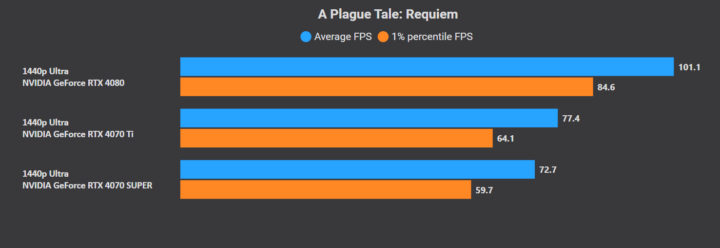
In “A Plague Tale: Requiem, ” the GeForce RTX 4080 averages 101.1 FPS, 30% higher than the 77.4 FPS offered by the RTX 4070 Ti.
Assassins Creed: Valhalla
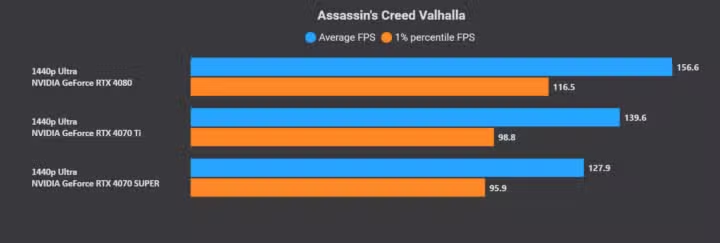
Assassins Creed: Valhalla performs well on both GPUs, averaging 156.6 FPS on the 4080 and 139.6 FPS on the 4070 Ti. A 12% difference.
Cyberpunk 2077
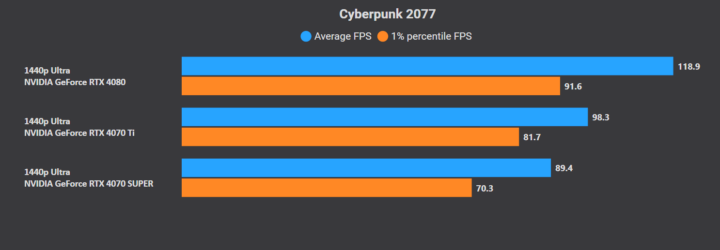
Cyberpunk 2077 was broken at launch, but it has since been polished into one of the best-optimized PC games. Night City averages 119 FPS on the RTX 4080, up from 98 FPS on the 4070 Ti. A 21% deficit for the latter.
Dying Light 2
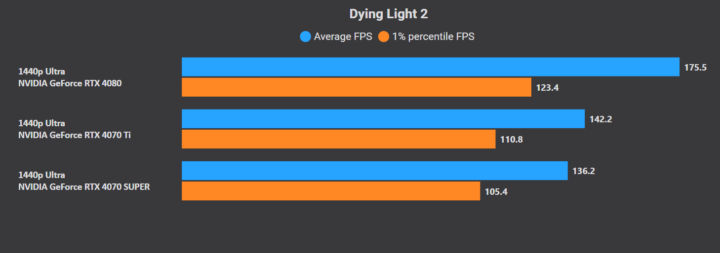
Dying Light 2 is markedly faster on the GeForce RTX 4080, averaging 175 FPS, 23% faster than the RTX 4070 Ti’s 142 FPS.
F1 2022
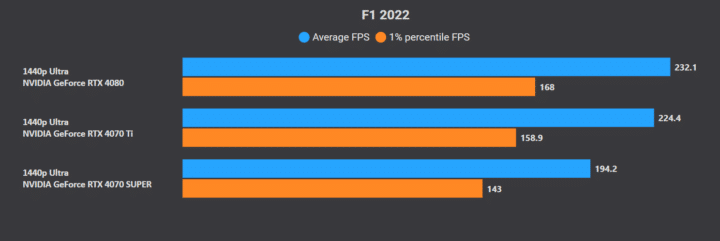
F1 2022 nets an average of 232 FPS on the GeForce RTX 4080, slightly higher than the 224 FPS on the RTX 4070 Ti.
Ghostwire: Tokyo

Ghostwire: Tokyo is another game that delivers similar performance on the two GPUs. The RTX 4080 posts 192.6 FPS, a smidge higher than the 4070 Ti’s 189 FPS.
Hitman 3
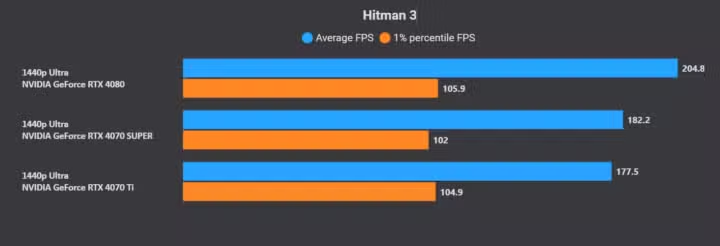
Hitman 3 runs at an average of 204.8 FPS on the RTX 4080, up from 177.5 FPS on the RTX 4070 Ti. A 15% deficit.
Hogwarts Legacy

Shadow of the Tomb Raider
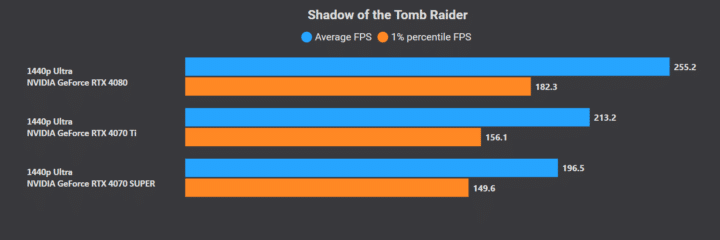
Shadow of the Tomb Raider pushes 250 FPS on the RTX 4080, averaging 213 FPS on the RTX 4070 Ti. A 19% delta in one of the most well-tuned games.
The Callisto Protocol
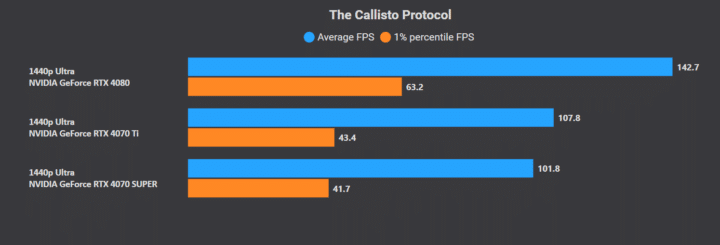
The Callisto Protocol performs much better on the RTX 4080, averaging 142.7 FPS. The GeForce RTX 4070 Ti is over 20% slower, with an average of 107.8 FPS.
Tiny Tina’s Wonderlands
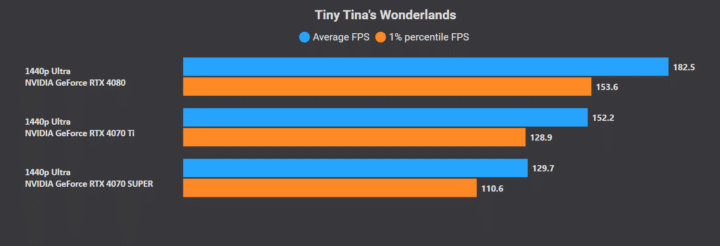
Tiny Tina’s Wonderlands runs 20% faster on the RTX 4080, producing an average framerate of 182.5 FPS. The 4070 Ti manages to hold its own with an average of 152 FPS.
Average 1440p Gaming Performance
The NVIDIA RTX 4080 outperforms the RTX 4070 Ti at 1440p by 15.8% on average. Across our 11-game benchmark, the 4080 averaged 172.23 FPS versus 148.7 FPS on the 4070 Ti. Such a deficit is less likely to have a noticeable impact on your gaming experience.
| Game | NVIDIA RTX 4070 Ti (Avg FPS) | NVIDIA RTX 4080 (Avg FPS) |
|---|---|---|
| A Plague Tale | 77.4 FPS | 101.1 FPS |
| Assassin’s Creed: Valhalla | 139.6 FPS | 156.6 FPS |
| Cyberpunk 2077 | 98.3 FPS | 118.9 FPS |
| Dying Light 2 | 142.2 FPS | 175.5 FPS |
| F1 2022 | 224.4 FPS | 232.1 FPS |
| Ghostwire: Tokyo | 189 FPS | 192.6 FPS |
| Hitman 3 | 177.5 FPS | 204.8 FPS |
| Hogwarts Legacy | 114.4 FPS | 132.5 FPS |
| Shadow of the Tomb Raider | 213.2 FPS | 255.2 FPS |
| The Callisto Protocol | 107.8 FPS | 142.7 FPS |
| Tiny Tina’s Wonderlands | 152.2 FPS | 182.5 FPS |
| 11 Game Average | 148.73 FPS | 172.23 FPS (+15.8%) |
The Conclusion: For 1440p gamers, the GeForce RTX 4070 Ti offers the right balance between price and performance. Opting for a 4080 doesn’t make much sense here.
NVIDIA RTX 4070 Ti vs RTX 4080: 4K Gaming Benchmarks
The screen pixel count is doubled at 4K, from <4 million at 1440p to 8.3 million. The higher memory bandwidth of the RTX 4080 is instrumental as the memory usage gets higher and higher. The L2 cache acts as a backup, servicing the L1 misses and reducing the load on the memory bus.
A Plague Tale: Requiem
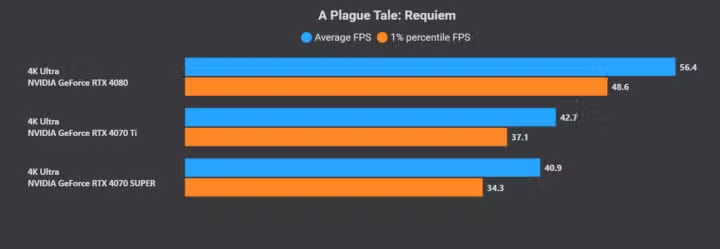
A Plague Tale Requiem is 32% faster on the RTX 4080, averaging 56.4 FPS, up from a paltry 42.7 FPS on the RTX 4070. We see a similar deficit in the lows.
Assassin’s Creed: Valhalla
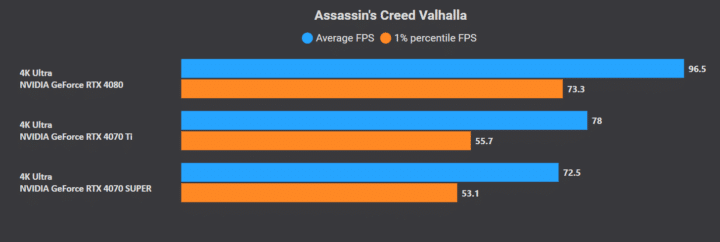
Cyberpunk 2077
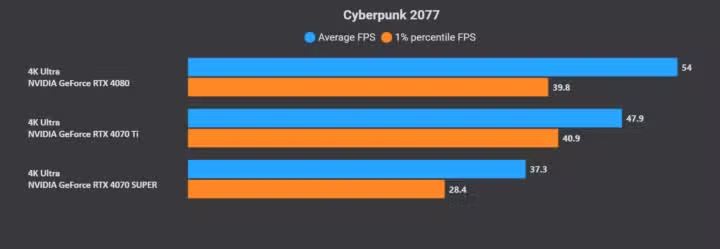
Assassin’s Creed: Valhalla runs 24% smoother on the RTX 4080, while Cyberpunk 2077 is a meager 12.5% faster. The latter averages 54 FPS on the 4080, versus a “barely playable” 47.9 FPS on the 4070 Ti.
Dying Light 2
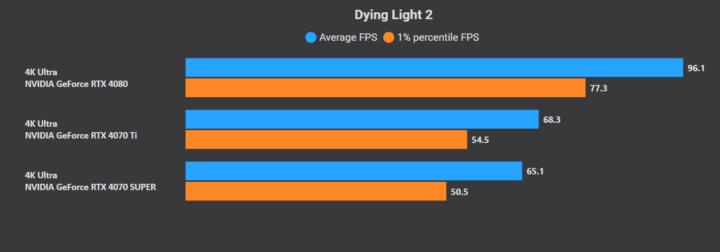
Dying Light 2 produces one of the largest performance deficits between the two GPUs. The GeForce RTX 4080 is 41% faster than the 4070 Ti in Techland’s latest zombie-thriller, averaging nearly 100 FPS.
F1 2022

Ghostwire: Tokyo

Ghostwire Tokyo is another title that scales well at 4K. It manages a healthy average of 101.9 FPS on the RTX 4080, versus 75.1 FPS on the 4070 Ti. We’re looking at a 36% lead for the former.
Hitman 3
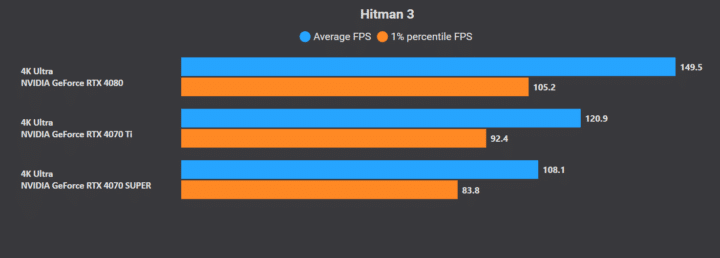
Hogwarts Legacy
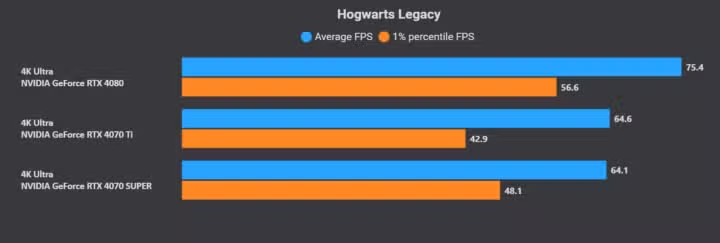
Hogwarts Legacy is a paltry 17% faster on the RTX 4080 than the 4070 Ti. It produces an average of 75.4 FPS on the 80 and 64.6 FPS on the 70-class GPU.
Shadow of the Tomb Raider
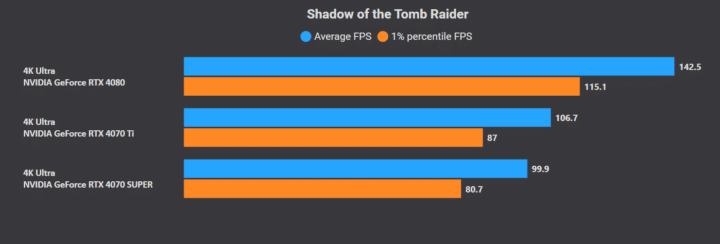
Shadow of the Tomb Raider nets an average framerate of 142.5 FPS on the 4080, up from 107 FPS on the 4070 Ti. A 33.5% deficit between the two GPUs.
The Callisto Protocol
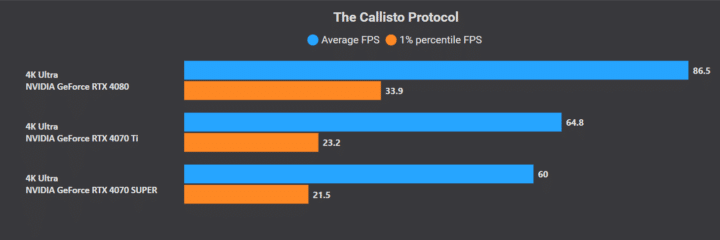
Tiny Tina’s Wonderlands
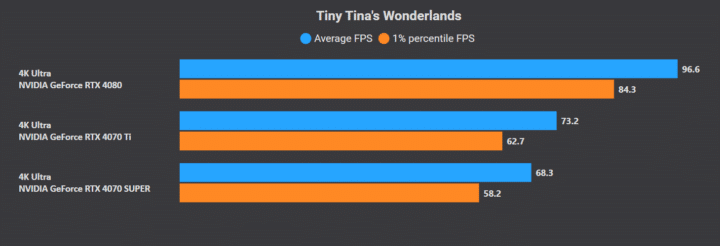
The Callisto Protocol and Tiny Tina’s Wonderlands exhibit similar performance deltas between the two GPUs.
Average 4K Gaming Performance
The RTX 4080 expands its performance lead over the 4070 Ti to 28% at 4K. Although the latter delivers over 60 FPS in most games, the lows tend to drop below playable. The 4080 averages 102 FPS in 4K gaming, making it the better GPU for Ultra HD.
| Game | NVIDIA RTX 4070 Ti (Avg FPS) | NVIDIA RTX 4080 (Avg FPS) |
|---|---|---|
| A Plague Tale | 42.7 FPS | 56.4 FPS |
| Assassin’s Creed: Valhalla | 78 FPS | 96.5 FPS |
| Cyberpunk 2077 | 47.9 FPS | 54 FPS |
| Dying Light 2 | 68.3 FPS | 96.1 FPS |
| F1 2022 | 132.2 FPS | 163.7 FPS |
| Ghostwire: Tokyo | 75.1 FPS | 101.9 FPS |
| Hitman 3 | 120.9 FPS | 149.5 FPS |
| Hogwarts Legacy | 64.6 FPS | 75.4 FPS |
| Shadow of the Tomb Raider | 106.7 FPS | 142.5 FPS |
| The Callisto Protocol | 64.8 FPS | 86.5 FPS |
| Tiny Tina’s Wonderlands | 73.2 FPS | 96.6 FPS |
| 11 Game Average | 79.5 FPS | 101.74 FPS (+28%) |
The Conclusion: The GeForce RTX 4080 distinguishes itself at 4K. With a lead of 28% over the 4070 Ti, it offers a smoother, more reliable gaming experience, especially in memory-intensive titles.
NVIDIA RTX 4070 Ti vs RTX 4080: Ray Tracing Benchmarks
Ray tracing is significantly taxing on GPUs, especially increasing the register and cache usage for the generation of BVH structures. The NVIDIA RTX 4080 holds a dominant position in these tests, oft beating the RTX 4070 by 50% or more. We tested the following games using the highest ray-tracing preset at 1440p native, without any upscaling or frame generation.
A Plague Tale: Requiem
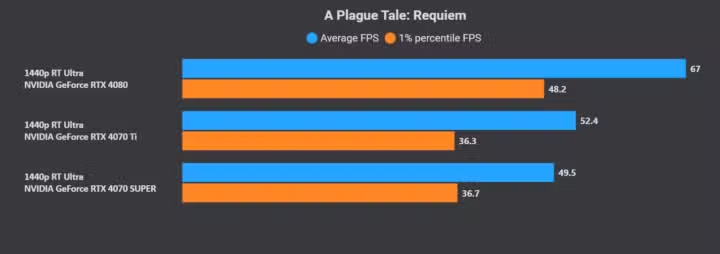
A Plague Tale: Requiem leverages ray-traced shadows. With it enabled, the GeForce RTX 4080 is 29% faster than the RTX 4070 Ti with a similar deficit in lows.
Cyberpunk 2077
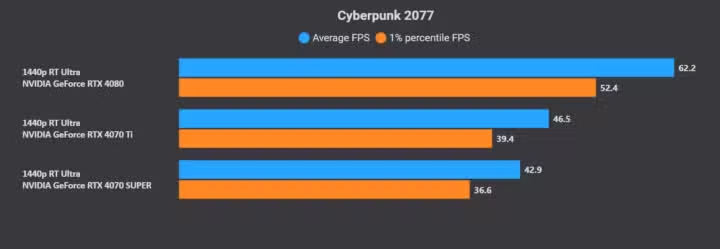
Cyberpunk 2077 demonstrates a similar performance delta between the RTX 4070 Ti and 4080. The latter averages 62 FPS, holding a 33% lead over the former’s 46.5 FPS average.
Crysis Remastered
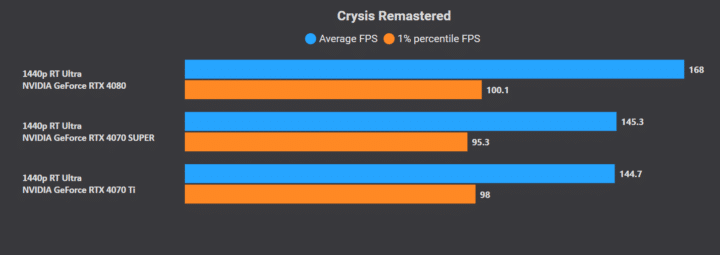
Crysis is an outlier, producing an insignificant 16% deficit between the 4070 Ti and the 4080.
Dying Light 2
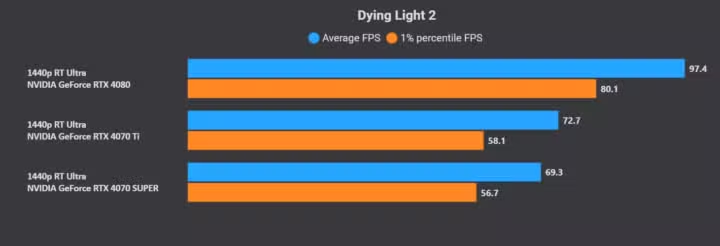
F1 2022

Dying Light 2 performs similarly to Cyberpunk, producing a 33% delta between the GPUs, while F1 2022 shrinks it to 22%.
Hitman 3
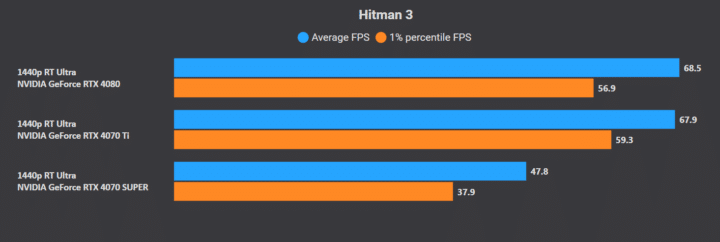
Ghostwire: Tokyo
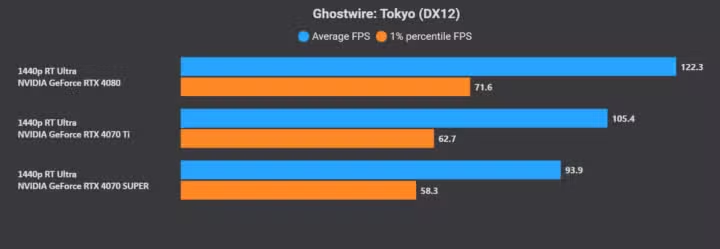
Ghostwire Tokyo suffers from poor hardware utilization, resulting in a timid 16% lead over the RTX 4070 Ti. This game nets poor lows on all GPUs, usually a sign of micro-stuttering.
Metro Exodus
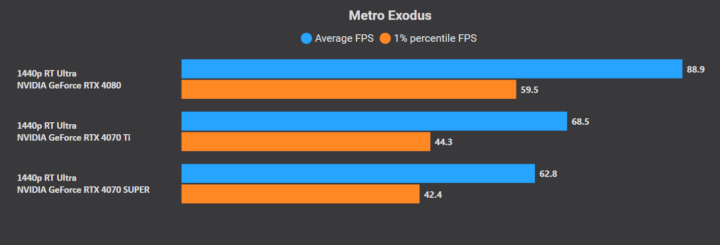
Shadow of the Tomb Raider
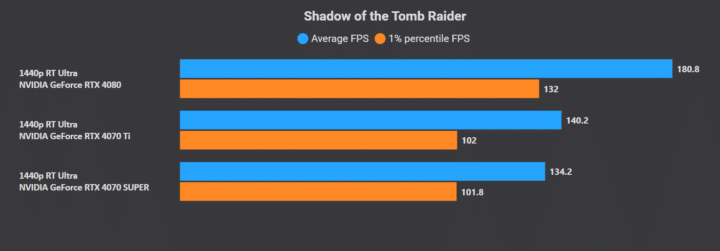
With average frames per second of 89 and 181, Shadow, Tomb Raider, and Metro Exodus run around 30% faster on the GeForce RTX 4080 than on the 4070 Ti. The Ti nets 69 FPS in Metro and 140 FPS in Shadow, respectable averages for a $700 GPU.
The Callisto Protocol
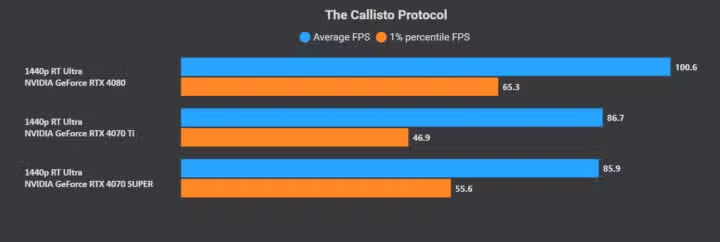
The Callisto Protocol hits an average of 100.6 FPS on the RTX 4080, versus 86.7 FPS on the 4070 Ti. Another title offering limited gains on the 80-class card.
Average Ray Tracing Performance
Ray tracing increases the GeForce RTX 4080’s advantage over the 4070 Ti to 22%. While the average performance of both GPUs is satisfactory, the latter experiences some stuttering, dropping below 60 FPS in several games. The 4080 mostly avoids these issues.
| Game | NVIDIA RTX 4070 Ti (Avg FPS) | NVIDIA RTX 4080 (Avg FPS) |
|---|---|---|
| A Plague Tale | 52.4 FPS | 67 FPS |
| Crysis Remastered | 46.5 FPS | 62.2 FPS |
| Cyberpunk 2077 | 144.7 FPS | 168 FPS |
| Dying Light 2 | 72.7 FPS | 97.4 FPS |
| F1 2022 | 96.4 FPS | 117.7 FPS |
| Ghostwire: Tokyo | 105.4 FPS | 122.3 FPS |
| Hitman 3 | 67.9 FPS | 76 FPS |
| Metro Exodus | 68.5 FPS | 88.9 FPS |
| Shadow of the Tomb Raider | 140.2 FPS | 180.2 FPS |
| The Callisto Protocol | 86.7 FPS | 95.3 FPS |
| 11 Game Average | 88.14 FPS | 107.5 FPS (+22%) |
The Conclusion: The GeForce RTX 4070 Ti isn’t that far behind the 4080 in ray-tracing. However, it suffers from intermittent drops in the most intensive games. The RTX 4080 maintains its grip.
Thermals and Power Consumption
The GeForce RTX 4080 has a TBP of 320W, just 12% higher than the RTX 4070 Ti’s 285W power limit. Neither GPU runs into its power limit, with the RTX 4080 peaking at 309W and the 4070 Ti at 275W.
| GPU | Peak power (W) | TBP |
|---|---|---|
| NVIDIA RTX 4080 | 309W | 320W |
| NVIDIA RTX 4070 Ti | 275W | 285W |
NVIDIA GeForce RTX 4070 Ti vs RTX 4080: Conclusion
The GeForce RTX 4080 is a decent 4K graphics card. It’s $999 price tag is the only deterrent. It should have launched at $799, and the 4070 Ti at $499. Given current pricing, it’s just too expensive for 1440p gaming. However, the larger memory buffer and cache make it more suitable for 4K.
Further reading:
